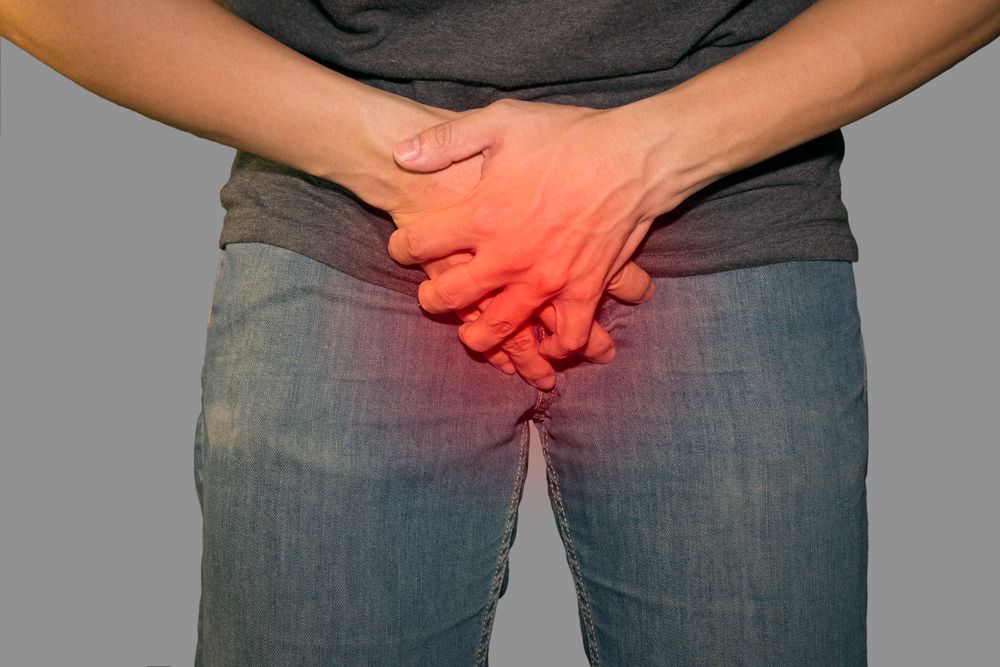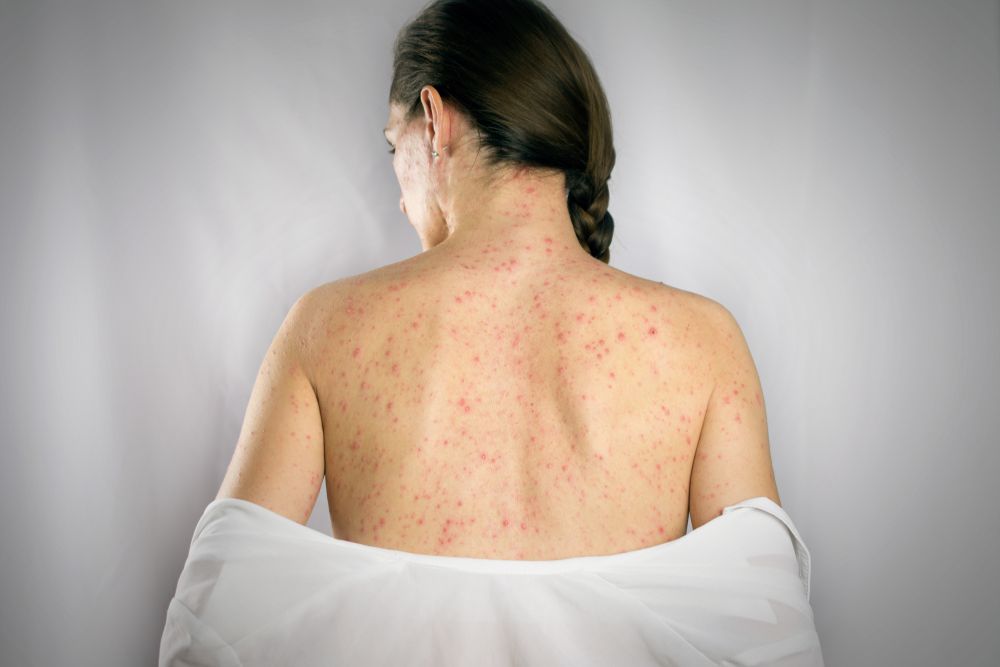Signs of Herpes on Your Penis (How to Tell)
Herpes on the penis is a form of genital herpes caused either by HSV-1 or HSV-2, both types of herpes viruses. (Learn More)
Many men who contract these viruses may not notice symptoms on their penis, or if they do, the sores and pain might be easily assumed to be something else. The first outbreak will be the most serious, with more sores and longer-lasting symptoms. (Learn More) Further outbreaks will be less intense, especially if you get an appropriate medical diagnosis and take antiviral drugs. (Learn More)
There is no way to self-diagnose whether you have herpes on your penis. If you are concerned, work with a doctor to understand the symptoms. (Learn More)
How Do I Find Out if I Have Herpes?

Typically, when someone discusses herpes, they mean genital herpes, which is a common skin condition caused by either herpes simplex 1 (HSV-1) or herpes simplex 2 (HSV-2). These viruses lead to outbreaks of rashes, red or seeping sores, itchiness, pain, and other symptoms on the genitalia, including the penis, scrotum, and thighs around the genitals. Between one in five or one in six people in the United States has genital herpes. Most do not know it, either because they do not know what to look for, they think their symptoms mean something else, they do not get regular testing for sexually transmitted infections (STIs), or they are asymptomatic. One estimate suggests that almost 90 percent of people who have genital herpes have no idea they have it. After contracting genital herpes, it can take weeks or months for the first outbreak to occur. In some cases, the first outbreak may not occur for years. Most people experience intense symptoms during their first outbreak, but this is not true for everyone. Mild symptoms, even during the first outbreak, can be mistaken for a common cold or mild case of the flu, with rashes or sores looking more like ingrown hairs, jock itch, or insect bites.
The First Outbreak on the Penis
For men, the first outbreak may be less intense than for women, who are more likely to experience intense itching and clear sores or rashes. Men may experience grogginess, fatigue, moodiness, and be feverish. Ultimately, they may feel like they have a cold or the flu. These symptoms will be accompanied with spots on or around the penis, scrotum, or surrounding skin. Typically, sores appear near the site of infection, which is most likely to be the head and shaft of the penis, but this is not always the case. The “classic” symptoms of genital herpes on the penis are sores, which may look like the following:
Lesions
Sores leaking fluid or pus
Small white blisters that appear like dry skin
Scabs that look like other wounds from other activities
Abrasions
Insect bites
Ingrown hairs
Pimples
Razor burn or rash
Hemorrhoids

For many men, the process of herpes appearing on the penis, scrotum, and surrounding areas will feel like:
Tingling of the skin in or around the penis.
Small, painful bumps or blisters about 24 to 72 hours later.
Burning, painful urination, especially if there are sores inside the penis.
Swollen lymph nodes as the immune system fights the infection.
Muscle aches.
Headache and fever.
Tiredness or feeling run down.
The first outbreak will last two to four weeks, with symptoms calming down and beginning to heal about two to three weeks in. If you experience painful sores that do not go away after a day, like a pimple or razor rash would, find a doctor who can run a screening for genital herpes. If you do have this condition, you can receive appropriate medical treatment, including antiviral drugs.
Further Outbreaks on or Around the Penis
The number of outbreaks you experience in a year depends on which virus causes genital herpes. Many men do not experience any outbreaks after the first one. The virus is still contagious, so it is important to get regular STI screenings to know if you have contracted herpes on the penis, scrotum, anus, or other areas. HSV-1 is more often associated with oral herpes, although the virus is increasingly found as the cause of genital herpes, including on the penis. There are fewer outbreaks, especially with open sores, associated with HSV-1, with the average being one outbreak per year. HSV-2 was the first virus diagnosed as genital herpes. The average person who does not take medication to manage the virus will experience four to five outbreaks per year. Antiviral medication works well to suppress both of these viruses, so you may not experience outbreaks at all with appropriate medical treatment. Once the first outbreak is over, you will know what the symptoms look and feel like for you. The early stages of a herpes outbreak are called the prodrome, which is the phase of viral reactivation. The initial symptoms may include feeling skin changes or nerve activation in the area, which may feel like:
Tingling
Sharpness
Itching
Pain
Tenderness
These symptoms may occur before any sores appear. If you take medication to manage herpes symptoms on your penis or surrounding area, then you may not experience sores at all. The manifestation of a herpes outbreak is very individual. The next time you suffer an outbreak of herpes on the penis, you will know what the symptoms are as soon as they start, so you can treat them with prescription medication and at-home options that can ease itching or discomfort. Especially if you take prescription antiviral medications, sores are less likely to cover a wide area or spread further. They will be more contained. Your immune system will know how to handle these lesions, and the antiviral medications will reduce how fast the virus reproduces and spreads.

Medical Treatment and Prevention Are Key
There is no cure for herpes. Many viral infections, like this one, are chronic infections and will require monitoring and treatment for the rest of your life. However, if you have a reasonably healthy immune system, you are not likely to experience too many outbreaks with sores on the penis or itching around the genitals, especially if you take antiviral medications as prescribed. It is also important to get regular STI screenings if you are sexually active, and always wear condoms and use dental dams for penetrative and oral sex. Have a conversation about sexual health with your sexual partners. Self-diagnosing genital herpes is complicated, and too many people brush aside concerns after the first symptoms appear. Getting a doctor’s help for an appropriate diagnosis is the only way to ensure you know whether you have genital herpes or not.
References
Herpes Signs and Symptoms. American Sexual Health Association (ASHA).
Herpes. (April 26, 2019). Young Men’s Health.
A Guide to Genital Herpes Symptoms in Males. (February 7, 2019). Healthline.
Genital Herpes. (October 3, 2017). Mayo Clinic.
What Are the Symptoms of Herpes? Planned Parenthood.

Related Articles

Allergies and Vertigo (Dizziness): Why It Happens and What to Do
If you have allergies, you may be dealing with several...

What’s the Most Effective Way to Treat Shingles? Can It Be Done Naturally?
If a rash has recently appeared on your body, you may...

Getting Over Performance Anxiety: What Works and What Doesn't?
Performance anxiety is a problem many people struggle...

Guide to Medication for Those Transitioning
People who are transgender have a different gender...
